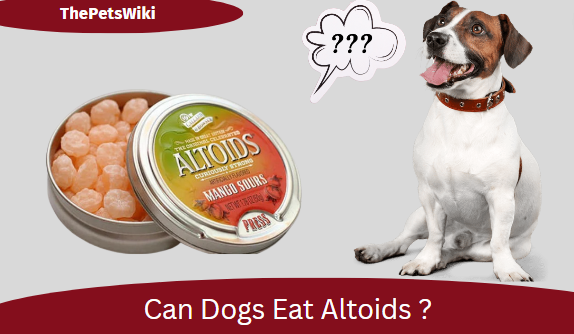Altoids, those curiously strong mints, are a favourite of many people worldwide. Their refreshing taste and compact tin packaging make them easy to carry around for a quick breath freshener. But, as a responsible pet owner, you may wonder: “Can dogs eat Altoids?” This article seeks to answer that question and provide insights into the potential risks associated with feeding these mints to dogs.
Do Read: Can Dogs Eat Airheads? A Comprehensive Guide
What Are Altoids?
Altoids are small peppermint-flavoured tablets that originated in England and are now marketed globally. They’re primarily known for their strong minty flavour and are typically used to freshen one’s breath. They come in various flavours, but the most popular is the original peppermint.
Can Dogs Eat Altoids? The Short Answer
No, dogs should not eat Altoids. While a single mint might not cause immediate harm, regular or large consumption can be toxic to dogs.
The Ingredients in Altoids
To understand why Altoids aren’t safe for dogs, it’s essential to review their ingredients. The primary ingredients in the original peppermint Altoids are:
- Sugar
- Gum Arabic
- Oil of Peppermint
- Gelatin
Why Altoids Are Not Safe for Dogs
1. Xylitol Risk
Although the original peppermint Altoids do not list xylitol as an ingredient, some mint or gum products contain this sweetener, which is highly toxic to dogs. Ingesting even small amounts of xylitol can lead to insulin release in dogs, causing hypoglycemia (low blood sugar), seizures, liver failure, or even death.
2. High Sugar Content
The primary ingredient in Altoids is sugar. While sugar isn’t inherently toxic to dogs, regular or large consumption can lead to obesity, dental problems, and even diabetes. Feeding your dog sugar-laden treats isn’t a good habit.
3. Peppermint Oil
Peppermint oil, while providing a strong flavour in Altoids, can be problematic for dogs when ingested in large amounts. It can upset their stomachs and, in some cases, even be toxic.
Symptoms to Watch Out For
If your dog accidentally consumes Altoids, you should monitor them for signs of distress or adverse reactions. Some potential symptoms include:
- Vomiting or diarrhoea
- Loss of appetite
- Lethargy or weakness
- Abnormal behavior
- Seizures
If you observe any of these symptoms or are concerned about the amount of Altoids your dog has consumed, contact your vet immediately.
Safe Alternatives for Dogs
If you want to give your dog a treat or something to freshen their breath, consider safer alternatives. There are several dog-friendly treats and chews on the market that can help with oral hygiene and bad breath. Look for products specifically designed for canine consumption, and always read ingredient lists carefully.
Final Thoughts
As a pet owner, it’s natural to want to share treats and snacks with our beloved pets. However, not everything safe for human consumption is safe for dogs. When it comes to Altoids, it’s best to err on the side of caution and keep them away from your canine companion. Remember, always consult with your veterinarian if you’re uncertain about giving any human food to your dog.
By understanding the potential risks associated with feeding certain foods to dogs and being vigilant about what they consume, we can ensure a long, healthy, and happy life for our furry friends.


